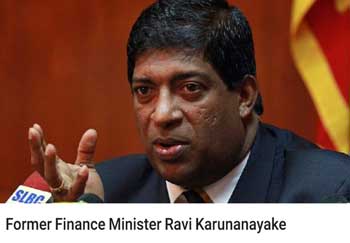Monday Feb 16, 2026
Monday Feb 16, 2026
Tuesday, 30 May 2023 01:48 - - {{hitsCtrl.values.hits}}
 State owned Enterprises (SOEs) are set to undergo reforms and other public enterprises engaged in commercial activities face performance optimisation more efficiently and effectively under public private ownership, a former Finance Minister disclosed.
State owned Enterprises (SOEs) are set to undergo reforms and other public enterprises engaged in commercial activities face performance optimisation more efficiently and effectively under public private ownership, a former Finance Minister disclosed.
These 527 SOEs and 52 of them are identified as strategically important and will be operated with private sector investment, generate revenues for the State, reduce the administrative burden on the State, and distribute ownership partially and management more widely to the private sector, former Finance Minister Ravi Karunanayake said.
He emphasised that according to official data 39 of the 52 strategically important public institutions are making profits while 13 of them are still making losses.
The losses incurred by 13 public institutions currently amount to Rs. 1,029 billion while the profits made by the 39 enterprises are at Rs. 218 billion, he said.
He also highlighted that the annual loss made by the public institutions is more than Rs. 811 billion, adding that only Rs. 28 billion have been paid by the profit-making public institutions as taxes to the treasury.
The restructure tool is used to improve their financial and operational performance and to make them operate on the strength of their balance sheets, he pointed out, adding that measures were also taken to reduce the flow of public funds to SOEs.
All these structural measures will enable Sri Lanka to strengthen the governance of SOEs and make them financially viable while alleviating their burden on public finances.
He suggested that Sri Lanka should follow the Temasek model of Singapore which is operated on a competitive basis, where the Government has no intervention in business.
The professionals running the business raise the revenue and make profits the same as in a private company and the work principles are set right from the beginning to be competitive.
He categorically stated under this set-up there is privatisation – as in a partial or full sale of assets – is not the only option for SOE reform.
For instance, there are other options like the vesting of performance and management in private sector contracts, Public-Private Partnerships (PPPs), holding companies, listing on the stock market, Employee Stock Ownership Plans (ESOPs), etc.
There is no single model. It is also important to follow Sri Lanka’s past experience with SOE restructuring – both positives and failures – rather than sticking to one and only procedure, he explained.
Therefore, enhancing the low level performances of SOEs by optimisation procedure is essential whilst ensuring transparency and accountability at this difficult juncture of trying to recover from economic crisis, he added.
In addition, as part of its IMF program commitments, Sri Lanka is devising a comprehensive strategy to restructure the balance sheets of some key SOEs, notably CPC, CEB, RDA and Sri Lankan Airlines (this strategy needs to receive cabinet approval by June 2023).
The precise timelines and restructuring modalities will be outlined in the Government’s reform strategy. The restructuring of Sri Lankan Airlines’ balance sheet will encompass its entire stock of debt (incl. its Government guaranteed international
The Government’s plan to restructure the SOEs on the directions of President Ranil Wickremesinghe is aimed at self-financing without depending on the treasury and it will be a reality soon, Karunanayake opined.
He assured that the Government had made a firm decision to have major controlling rights of the non-strategic enterprises in the optimisation or commercialisation process and dismissed claims of total privatisation.
President Wickremesinghe needs the support of his Government and the Opposition for the successful implementation of successful SOE reform prescribed by the International Monetary Fund (IMF).
“We have to walk the talk and fulfil Sri Lanka’s obligation of IMF commitments relating to SOE reforms within six months and the Government has short-listed transaction advisors to assist in the divestiture of four SOEs in less than three months.
They are Sri Lanka Insurance Corporation , Hotel Developers Lanka (Hilton Hotel Colombo), Canwill Holdings (Grand Hyatt Hotel), and Litro Gas Lanka Ltd including Litro Gas Terminals Ltd (LPG retailing).
According to the IMF, reducing the roles of the Government and SOEs in the economy is important for a more efficient allocation of resources, fostering competition, and boosting productivity.
The reforms to strengthen SOE governance under the program is the critical first step in this regard.
Cabinet approval will be sought of a comprehensive strategy to restructure the balance sheets of the Ceylon Petroleum Corporation (CPC), Ceylon Electricity Board (CEB), the Road Development Authority, and SriLankan Airlines by June 2023.
Prompt publication of audited financial statements will be made for all 52 major SOEs while prohibiting new foreign exchange borrowing by nonfinancial SOEs which have foreign currency debt amounting to $ 45.5 billion with limited foreign exchange revenues.
In addition, the authorities commit to further strengthen SOE governance by clarifying the mandates of key SOEs through Statements of Corporate Intent and by reviewing the framework for selecting SOE board members.
He noted that Sri Lanka has shown successful results from the privatisation of several State entities during the periods of late 1980s to around 2004.
At least 43 commercial entities were privatised and from 1995 to 2004 saw the privatisation of larger, more complex sectors such as telecommunications, gas, and airlines.
In fact, the much-hailed Sri Lanka Telecom (SLT) privatisation was carried out during this period, he revealed, adding that such enterprises have undergone performance optimisation making more profits rather than in State control.
He noted that the SOE reforms envisaged are expected to contribute towards higher economic productivity by reducing market distortions, increasing organisational efficiency and improving the quality of service to the public.